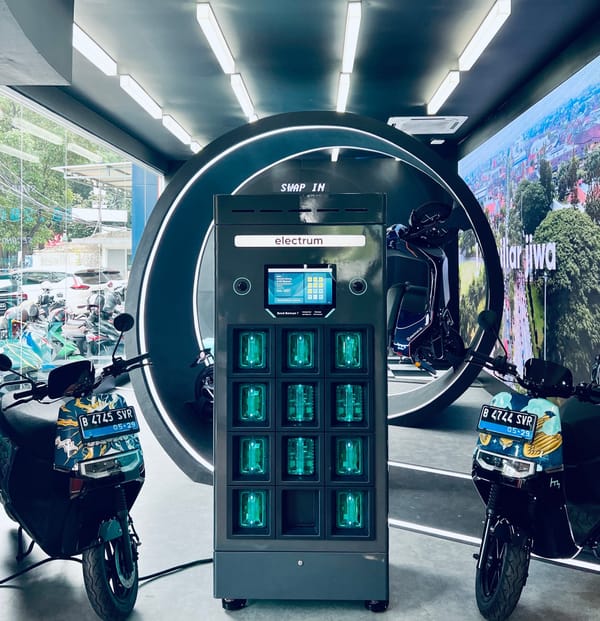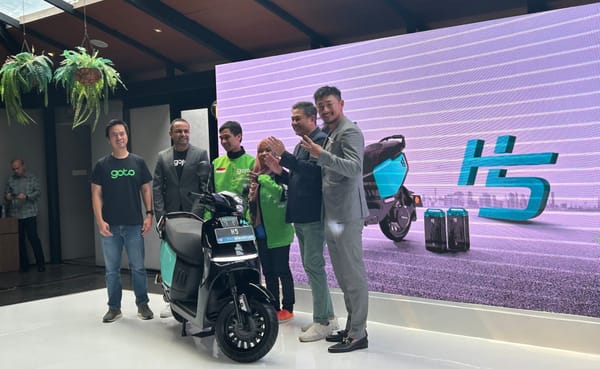Electrifying Fleet Operations: How Businesses Can Reduce Costs and Emissions with EV Motorcycles

I’ve spent a lot of time talking to business owners and fleet operators in Indonesia, and one thing is clear—efficiency is everything. Whether it’s cutting costs, reducing downtime, or meeting sustainability goals, companies are constantly looking for smarter ways to optimize their operations. And after working closely with partners like Blitz and Dash, I can confidently say that electric motorcycles (EVs) and IoT-enabled smart infrastructure are no longer just an alternative—they’re a competitive advantage.
1. Leveraging IoT Capabilities for Smarter Fleet Management
One of the biggest game-changers in EV motorcycle adoption is the integration of robust Internet of Things (IoT) tools. These capabilities go far beyond simple GPS tracking:
• Real-Time Location Tracking & Security
Companies like Dash emphasize the importance of real-time visibility, not only to streamline daily operations but also to bolster fleet safety.
“As a fleet manager, real-time visibility and safety are critical to our operations. The ability to track bike locations ensures operational efficiency and security, while the remote disable feature helps prevent misuse and unauthorized use of our fleet.” — Dash
• Predictive Maintenance & Battery Diagnostics
Continuous monitoring of EVs helps fleet operators prevent costly breakdowns by identifying potential issues in advance. This proactive approach ensures minimal downtime and maximizes vehicle availability.
• Seamless Energy Management
Dash praises the convenience of remotely topping up drivers’ Energy Points (EP) through Electrum’s fleet dashboard. This eliminates the need for couriers to manage battery top-ups themselves, keeping them focused on deliveries.
2. Cost Savings & Operational Benefits
Switching from traditional internal combustion engine (ICE) motorcycles to EVs can unlock significant financial advantages:
• Reduced Fuel Expenses & Downtime
Battery swapping technology allows quick replacements, minimizing the downtime drivers would otherwise face at fuel stations or during lengthy charging sessions. Blitz, for instance, strategically maps swapping stations with IoT data to further reduce wait times.
“Traditional ICE bikes require frequent refueling, which leads to downtime. With our data-driven swapping stations, we cut wait times drastically, boosting overall fleet efficiency.” — Blitz
• Lower Total Cost of Ownership (TCO)
Maintenance costs drop because EVs have fewer moving parts than ICE motorcycles. Dash finds that EVs used for quick-commerce deliveries (covering 100–120 km per day) reduce operational expenses—particularly on fuel—by up to 20%, while still ensuring healthy margins for the company and decent earnings for drivers.
• Higher Earnings for Gig Workers
When fleets are optimized for efficiency, drivers see direct financial benefits. Some GoJek drivers upgrading to Electrum-powered EVs report a 20% increase in earnings per kilometer traveled, thanks to improved route optimization and less idle time.
3. Environmental Impact: Measurable CO₂ Reductions
Sustainability isn’t just a buzzword; it’s a core metric that top fleets are actively tracking:
• Electrum’s Total Daily Carbon Offset
Across Electrum’s ecosystem of 5,000 active bikes traveling a combined 380,000 km each day (with 15,000 battery swaps), 10 tons of CO₂ are offset daily. This underscores the tangible, large-scale environmental benefits of EV integration.
• Dash’s CO₂ Savings

Each Dash driver using Electrum EVs avoids 94.4 kg of CO₂ per month, contributing to a total reduction of 70 tonnes of CO₂e across the entire fleet.
By showcasing these real numbers, both partners demonstrate that operational efficiency can go hand-in-hand with a cleaner environment.
4. Success Stories: Real Results for Businesses and Drivers
Beyond numbers, the real success lies in empowerment—both for companies seeking a competitive edge and for the drivers themselves:
• Blitz
Predictive battery swapping keeps vehicles on the road, generating more revenue per kilometer traveled. By effectively integrating IoT insights with Electrum’s smart battery infrastructure, Blitz increases driver productivity and profitability.
• Dash

“Success at Dash isn’t just about cost savings or environmental impact—it’s about empowering drivers.”
Many gig workers still rely on older motorcycles purchased during ride-hailing’s boom period. Dash’s partnership with Electrum offers these drivers the chance to upgrade to cost-effective, high-performance EVs. The Rent-to-Own program, for example, has already helped over 100 drivers move toward EV ownership—reducing their daily operating costs and contributing to a healthier planet.
5. Market Trends & Future Outlook
The Indonesian government’s push for greener mobility, coupled with the expansion of battery swap stations, sets a promising stage for rapid EV adoption in fleet operations. Operators like Dash and Blitz see battery swapping as critical to minimizing downtime; waiting 1–2 hours for a full charge is unfeasible for high-frequency deliveries.
Looking ahead, the battle for fleet dominance will hinge on operational efficiency, automation, and data-driven decision-making. EV fleets equipped with real-time tracking, predictive maintenance, and intelligent routing aren’t just saving costs—they’re creating a structural advantage in speed, pricing, and sustainability.
Conclusion: Paving the Road to a Greener, More Profitable Future
Electrum’s partnerships with Blitz and Dash highlight the transformative impact of EV motorcycles in Indonesia’s fast-growing delivery and logistics landscape. By combining IoT-driven insights with flexible financing options and strategic battery swapping infrastructure, these companies demonstrate that reducing emissions and lowering costs aren’t mutually exclusive goals—they work together in a virtuous cycle.
For businesses, the takeaway is clear: electrifying fleet operations can pay dividends in the form of higher margins, satisfied drivers, and measurable environmental benefits. As government policies continue to support EV adoption and swapping stations proliferate, the door is wide open for operators ready to embrace a cleaner, smarter, and more profitable model of transportation.
Ready to join the EV revolution? Embrace the power of IoT, battery swapping, and forward-thinking partnerships to future-proof your fleet—and the planet.
#FleetManagement #ElectricVehicles #EVRevolution #IoT #Sustainability #SmartMobility #Indonesia #LogisticsInnovation


